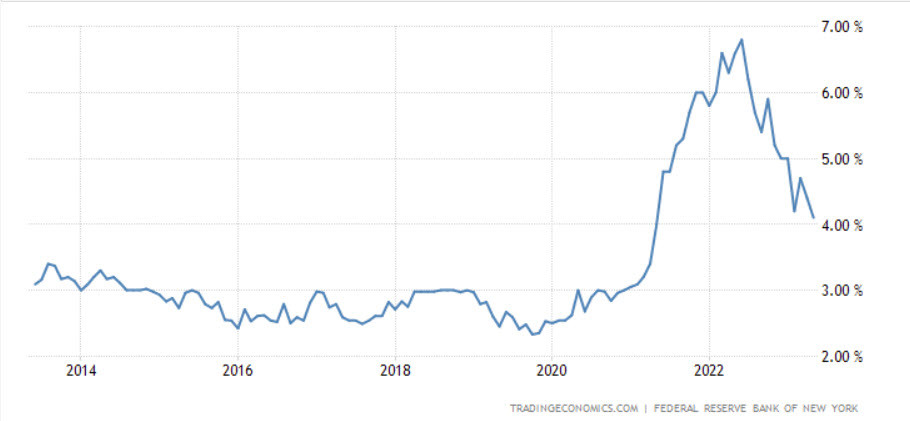New York Fed Consumer Survey Sees Near Term Inflation Expectations @ 2-Year Low As Economic Outlook Worsens
12:30 p.m. ET
There’s not much in the way of U.S. macro data today, but the rest of the week is busy with CPI tomorrow and the FOMC policy decision Wednesday. The CPI report will be the last big piece of inflation data ahead of Wednesday’s policy decision in which the Fed is expected to pause its rate hike. The market has recently been pricing in a higher probability of a resumption of hikes in July, but the historical record argues for a pause equaling the end of the Fed rate hike cycle. The bond market has had an excellent track record with this particular forecast. When the 2-year yield crosses below the Fed funds Rate, more often than not, the Fed’s rate hike cycle is done.
Fed funds rate (blue) and 2-year yield (red) with the 2-year crossing below (highlighted red) leading to a Fed pause of rate hikes, and eventual cut (blue arrow) into recessions (shaded gray).
While tomorrow’s CPI report will be more closely watched, this morning the New York Fed’s Consumer Survey found that short-term inflation expectations declined further. While inflation is most certainly affected by government debt, deficit spending, supply chain disruptions (as we saw due to COVID), consumer demand, etc…inflation also has a strong psychological component. In fact, hyper-inflation is almost exclusively a psychological event in which the masses loose faith in, and reject a sovereign currency. I’m not making the case that the U.S. faces hyperinflation, but I am pointing out that inflation expectations (the psychological aspect) do play a role in actual inflation.
The NY Fed found that short-term 1-year inflation expectations dropped again to 4.07% in May from the previous month’s 4.45%, which is the lowest reading since May 2021. There was a modest increase in inflation expectations at both the three-year-ahead horizon (rising to 2.98% from 2.89%) and five years (rising to 2.72% from 2.64%).
“Median inflation uncertainty—or the uncertainty expressed regarding future inflation outcomes—declined across all three horizons.”
 1-year inflation expectations. Source: New York Fed/Trading Economics
1-year inflation expectations. Source: New York Fed/Trading Economics
“Perceptions about households’ current financial situations deteriorated in May with more respondents reporting being worse off than a year ago and fewer respondents reporting being better off. Similarly, year-ahead expectations deteriorated with fewer respondents expecting to be better off a year from now and more respondents expecting to be worse off.”
What I found interesting, since Fed chair Powell set up the June pause in the last FOMC’s presser as possible due to banks tightening credit lending/standards, which would effectively do the Fed’s job of tightening financial conditions for it without needing to hike further, was the following,
“Perceptions of credit access compared to a year ago deteriorated slightly in May. The share of households reporting that it is more difficult to obtain credit now than a year ago increased, while the share reporting that it is easier declined. Similarly, respondents’ views about future credit availability deteriorated slightly. The share of respondents expecting tighter credit conditions a year from now increased, while the share expecting looser credit conditions declined.”
Yields didn’t have a notable reaction to the release of the survey data, and tomorrow’s CPI will certainly be much more closely watched ahead of Wednesday’s FOMC decision, but the survey supports the notion of a Fed rate pause Wednesday, which I’ve been expecting for several reasons, not the least of which is the bond market’s view that the Fed has done enough as seen above (2-year yield vs. Fed funds Rate).
Fed Funds Futures are currently pricing in a 74.7% chance the Fed pauses Wednesday with no rate hike, which is actually down from 84.5% a month ago, but recall the dozen or so Fed speakers over recent weeks who made it their mission to talk back up the market’s view of rate policy (more hawkishly) after it dropped sharply following Powell’s press conference after the last FOMC. Still, probabilities favor no hike Wednesday.


